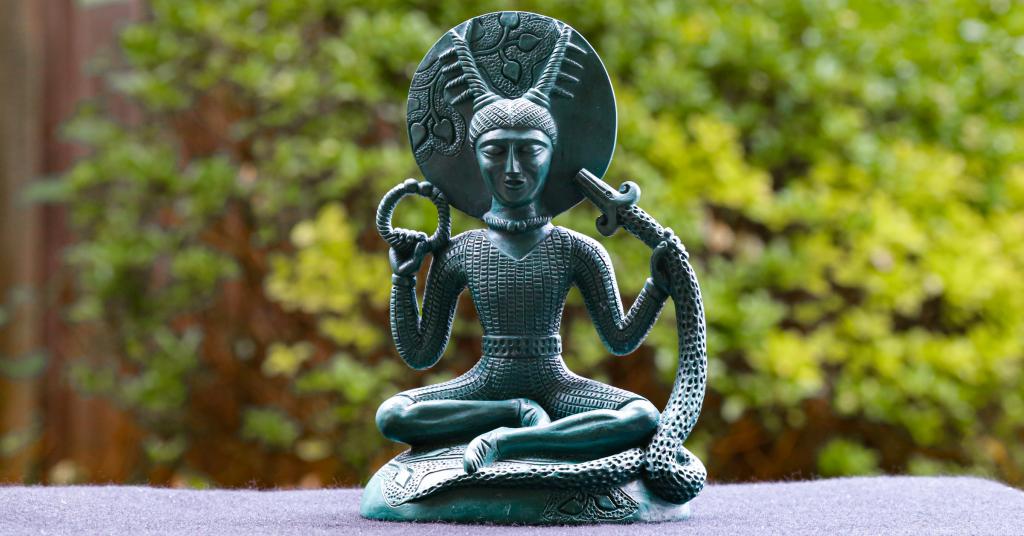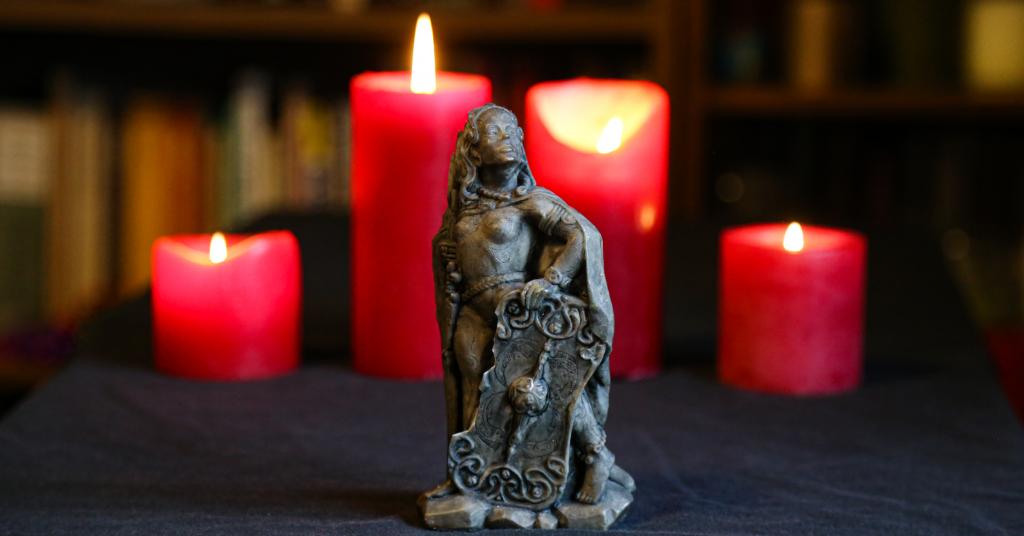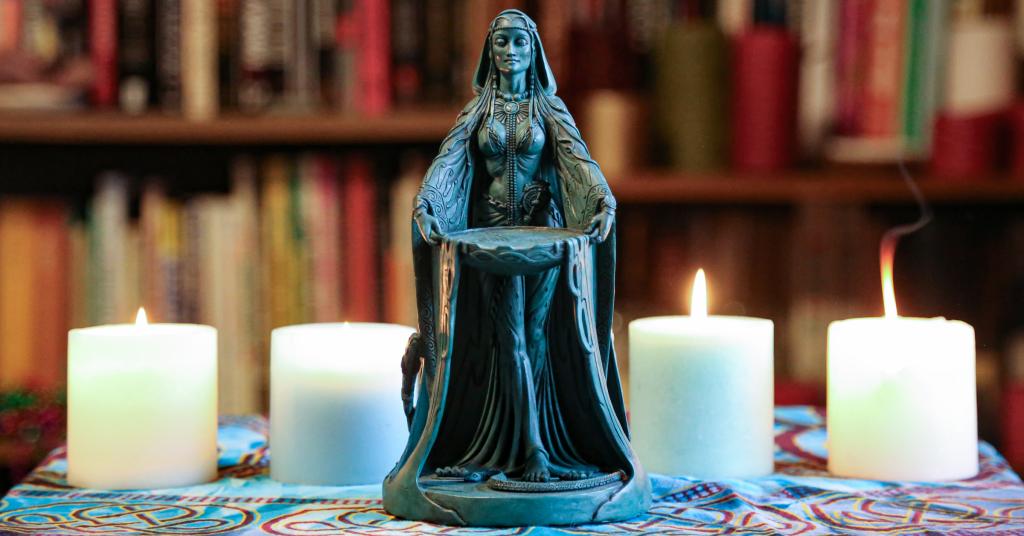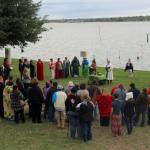Last week I came across a tweet asking “do you consider humans to be the children of the Gods?” It was presented as a poll – the possible answers were “yes” “no” and “unsure”.
My initial response was “yeah, sorta kinda, but it’s complicated.” I started to elaborate, then realized there was no way I could say what I wanted to say in 280 characters.
This is a good question. Your answer will depend at least in part on how you understand the Gods. I’m a polytheist who acknowledges many Gods, and who worships, works with, and works for several. My answer comes from this perspective.

Literally, no
Some creation myths teach that the Gods created humans, or at least that those Gods created these humans. My myths don’t. While I don’t call myself a Celt, most of the deities I’m affiliated with were first known by Celtic peoples, and there is no Celtic creation myth. And even if there was, myths are stories to communicate meaning, not to record history.
If you ask me where we came from, I’m going to respond with the Big Bang and Evolution. What science truly knows, it knows well. What happpened before the Big Bang? Why is there something rather than nothing? Assuming that the Many Gods are behind it all is no more certain than fundamentalists who insist that their One God created everything. Maybe They are and maybe They aren’t.
I don’t know, and I don’t think we can know. And I don’t think it’s terribly important that we do know. We are here. The Gods are here. The main question isn’t how we got here, it’s what we do given that we are here.
So no, the Gods are not our parents, at least not literally.
Metaphorically, sometimes
When we realize that we are here and the Gods are here, we do what we do – we form relationships. But if we are wise, we quickly realize that these are not relationships among equals. Whatever else They may be, the Gods are older, stronger, and wiser than we are.
We already have experience being in relationships with persons who are older, stronger, and wiser – our parents. And so it’s natural that we look to our Gods in the same way we looked to our parents: for sustenance, for protection, and for guidance.
There are many Mother Goddesses in the stories of our ancestors. There are some Father Gods. Most of those titles come from what They do in those stories: Demeter is a Mother Goddess, but She is the mother of Persephone, not the mother of the Greek people.
Not every human-divine relationship follows the parent/child model. Danu has been a mother to me, at least at times. The Morrigan, not at all.
People who fill important roles for us may become a father figure or an adopted mother. Likewise, a God may take on a parental role in our lives.
So yes, sometimes the Gods are our metaphorical parents.

Healthy parenting
The problem is that many of the examples we draw on aren’t exactly healthy. Some of us had toxic parents. Others had parents who tried hard but were in over their heads. And then there’s the elephant in the room: the Father God of Christianity who – at least in some versions – is a textbook example of a criminally abusive parent.
It’s very hard to grab onto one part of what we know about parents without grabbing the rest of what we know, even if we’d rather not.
Gods are always virtuous – that’s one of the dividing lines between Gods and not-Gods. So to the extent that the Gods are our parents, They are doing so in a healthy manner. That means They’re trying to help us learn and grow so we can stand on our own, not trying to keep us perpetually dependent on Them. Whatever kind of metaphorical parents They may be, They are not helicopter parents.
But some of us who experience the Gods have experiences that are not examples of healthy parenting. Sometimes They’re demanding. Sometimes They put us into dangerous situations. Sometimes They take over someone’s life and turn it upside down, for reasons no one can understand. I have some thoughts on the ethics of that, but I have no solid answers.
When this happens, it doesn’t mean the Gods are being bad parents. It means the parental metaphor breaks down and is no longer useful.
They don’t parent forever
At some point, parents stop parenting. Children grow up, move out of the house, and begin lives on their own. If the relationship is healthy – more or less – the power dynamic shifts from greater/lesser to one of equals. Still, there will be some respect, formality, and even deference (more ceremonial than substantial) in recognition of the debt we owe to those who brought us into this world and helped us reach adulthood.
I’m speaking of good, respectful, healthy parents. If your parents were abusive, toxic, or in other ways harmful, you owe them nothing. But now we’re getting away from the topic of this post.
Your relationship with a God in year ten will likely not be the same as it was in year one. The hand-holding stops. The expectations are higher.
Or not. Each human-divine relationship is its own thing. If you reach your limits – or if you’ve simply done all you’ve been asked to do – it’s possible you will stay there for the rest of your life. If you’re happy there – and if They’re happy there – that’s fine.
But our human parents expect us to grow up into adults, and so do our divine parents.

Working with the Gods
If the parent/child relationship has been successful, at some point you’ll be a spiritual adult, able to do things on your own – for yourself and for Them.
What is the work of your Gods? What are Their virtues? How can those virtues best be embodied? What are Their values? How can they be spread around the wider society? How can you best support Their mission and contribute to Their work?
This is how we become a part of something greater than ourselves, even as we retain our own autonomy.
This doesn’t mean we abandon worship. We continue to honor our parents after we’re their equals because of what we owe them, and because we love them. No matter how much we learn and grow, we are never the equals of the Gods. And so we continue to worship Them, even while we’re doing Their work without a lot of supervision.
A complicated question
There’s no simple and straightforward answer here. While the Gods are not literally our parents, there are good reasons to see Them as our parents. And there are also bad reasons to see Them as our parents.
Ultimately, I think the answer you give is less important that how you arrive at that answer.
Are you projecting your experiences with your human parents – good, bad, or a mixture of both – onto divine persons? Is your relationship with your God or Gods a healthy, respectful one? Are you on your way to becoming a spiritual adult? Or are you stuck in spiritual infancy?
I wish you well on your continued journey.
















